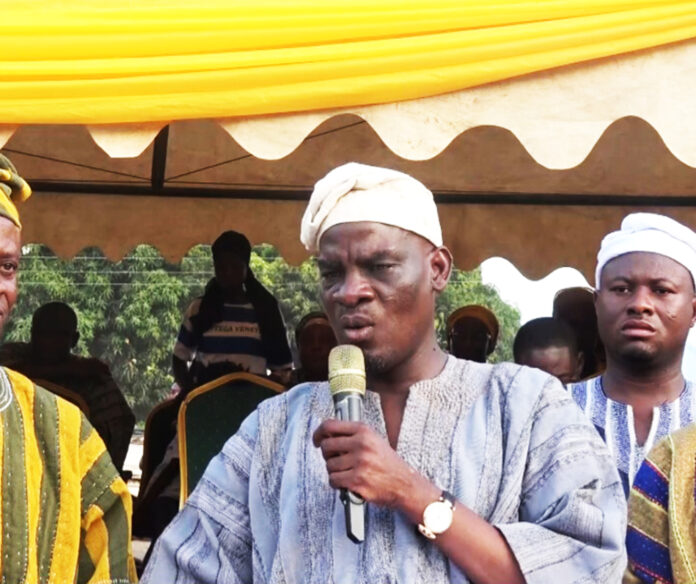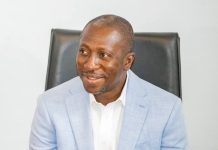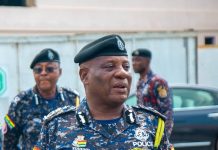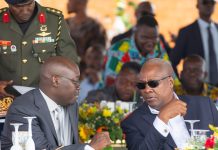In a nation where democracy is both cherished and challenged, the sanctity of voting rights stands as a cornerstone for Ghana’s political landscape. There is a paramount importance in preserving these rights to ensure a thriving democracy.
There must, therefore, be transparency and integrity in Ghana’s electoral system, a system upon which the foundation of democracy hinges.
These were the words of the Member of Parliament for Temale South, Haruna Iddrisu, during the celebration of Sonyo Deng Festival – an annual feast of dance (Deng) and sacrifice among the Valga, Safalba, Choruba and Nomme/Batigee tribes or people.
This annual festival is celebrated by the chiefs and people of Sonyo in the Bole district of the Savannah Region.
Haruna Iddrisu called for a resounding peace and fairness in the electoral process, ahead of the December 7, 2024 polls.
Drawing upon historical precedence, he cited instances where the concerns of the opposition NDC were vindicated, underscoring the imperative of inclusivity in voter registration processes.
Such inclusivity, Haruna argued, was essential in safeguarding the rights of all citizens to participate in shaping the destiny of their nation, irrespective of political affiliations or social status.
Haruna Iddrisu articulated a vision for a more accessible and efficient voter registration system, one befitting of Ghana’s status as a modernizing democracy.
In embracing the digital era, the Tamale South Legislator envisioned a future where individuals could register to vote, upon reaching the age of eligibility without the need for cumbersome and time-consuming periodic registration exercises.
Brimming with confidence ahead of the December polls, the former Minority Leader in Parliament, expressed unwavering confidence in the ability of former president John Dramani Mahama to emerge victorious in any elections characterised by freedom, fairness and credibility.
On digitalisation of Ghana’s electoral proceedings, Haruna called for a paradigm shift and called for a less cumbersome electoral process that is powered by technology.
“It was a call to embrace technological advancements as a means of democratising access to the ballot box and empowering citizens to exercise their fundamental rights with ease and convenience.”
Beyond the realm of electoral politics, Haruna Iddrisu, who is loved by the people of Tamale and beyond for his sense of dedication to the masses, lent his voice to broader economic issues facing the nation.
In this respect, he lauded John Dramani Mahama’s ambitious 24-hour economy initiative as a strategic endeavour to combat unemployment and stimulate economic growth.
By creating an enabling environment for both public and private sectors to operate efficiently and deliver goods and services to the Ghanaian people in a timely manner, Haruna Iddrisu recognised the initiative’s potential to drive prosperity and improve the livelihoods of citizens across the nation.
Taking his turn at the event, Isaac Mwangu, President of the Vagla Youth Association, echoed Haruna Iddrisu’s sentiments, emphasising the importance of cultural preservation and community development in the Savanna region of Ghana.
For Isaac Mwangu, the annual festival served as a testament to the rich tapestry of Ghanaian culture, bringing together tribes from across the region to celebrate their shared heritage and traditions.
More than a mere spectacle, the festival represented a platform for tourism and economic development, attracting visitors from far and wide and showcasing the unique offerings of the savanna region of the world.
Isaac Mwangu highlighted the festival’s medicinal benefits and its role in promoting health and prosperity among attendees.
He also drew attention to the absence of witch camps in the region, attributing this phenomenon to the protective deity, Sonya Kipo god, which he believes safeguarded the community from harm and adversity.
While Haruna Iddrisu and Isaac Mwangu focused on issues of governance and cultural preservation, Mr. David Baakun Deng, speaking at the festival shifted the conversation to matters of community cohesion and solidarity.
As a representative of the Sonu community, Mr Deng emphasised the collective battle faced by its members and urged unity in the face of adversity. .
Acknowledging the diverse roles played by individuals within the community – such as fathers, mothers, sisters and brothers – Mr Deng called upon his fellow citizens to rally together in support of one another.
He pledged the community’s unwavering support to those in need and outlined plans for future collaboration and development initiatives, including improvements to infrastructure, mobile networks and recreational facilities within the community.









